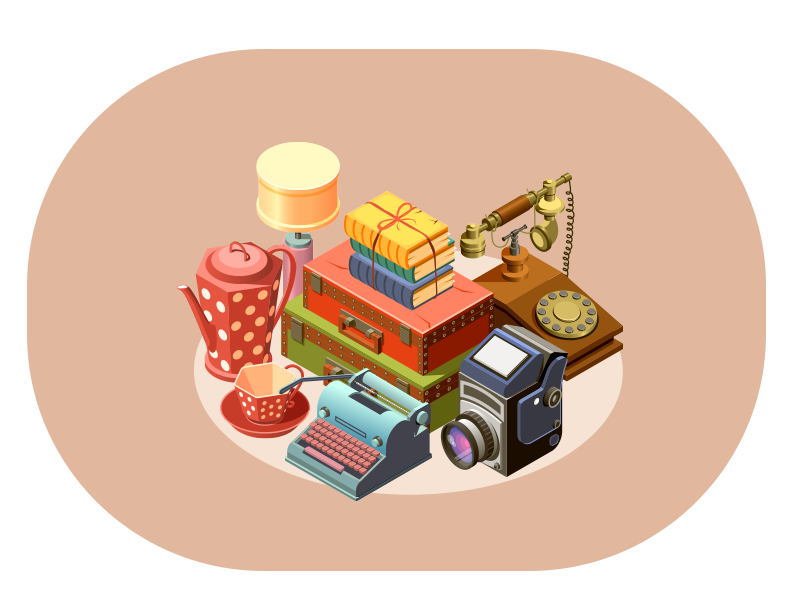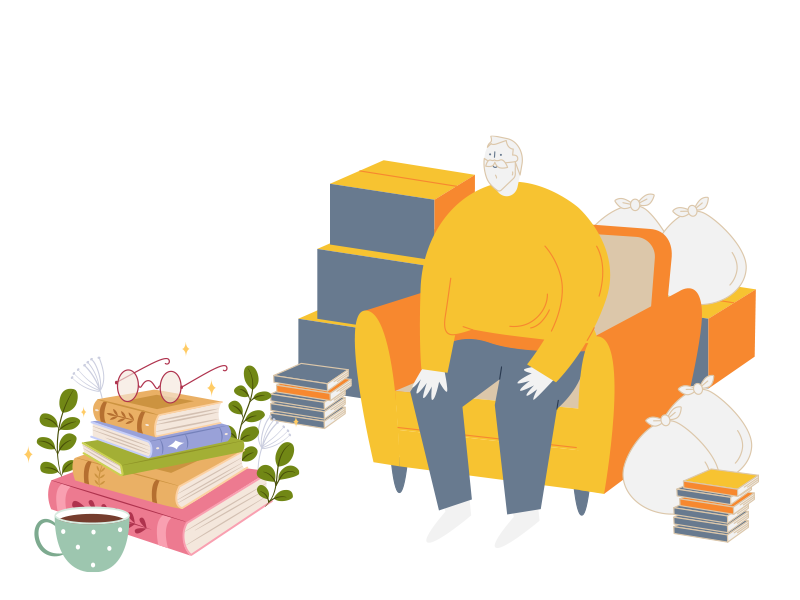Am I A Hoarder? 25 Useful Questions to Find Out

Are you a hoarder? Others might know you are a hoarder before you discover it yourself. It is estimated that there are between five and 14 million compulsive hoarders in the United States. An exact figure is difficult to obtain, due to the secrecy and invisibility of many hoarders.
Hoarding has finally come out of the shadows. Over the past few years, several television shows have displayed extreme examples of the many hoarders. People view it as a harmless obsession or a severe mental disorder. There is no reason for allowing stacks and piles and heaps of debris to accumulate and take over every livable space in a home.
11+ Years Experience dealing with Hoarding
Need someone to talk to that understands hoarding?
Get a Free Hoarding Clean-up Estimate.
Or call us today for immediate assistance.
Am I a Hoarder?
More people are beginning to ask the question, “Am I a hoarder?” If you are faced with a closet filled with unidentifiable, miscellaneous stuff, and you wonder if these are hoarding tendencies, stop and ask yourself a few revealing questions.
- Are the counter-tops and desktops in your home visible? Hoarders use every available space to place their treasures. If you can’t prepare dinner in your kitchen because you piled three months worth of items on the counter, you might have a problem. If it is impossible to work on your computer at your desk or see the television screen over the piles of old magazines stacked in front of it, you may have an issue to confront.
- When is that last time you threw anything away? If you are in the habit of acquiring things because you may need them at some unforeseeable time in the future, this could also be signs of hoarding.
- Do you define your excessive possessions as your collection? Collectors seek out specific items to possess and display them in an organized, attractive manner. However, hoarders gather items randomly and stash them unconsciously anywhere they can. Distinguish between the two motives when trying to identify your behavior.
- Can you identify a need for everything you have? If you don’t have an immediate or near term need for something, it has no sentimental value, and you have no place to keep it, there is no logical explanation for hanging on to it other than having a hoarding tendency.
- Do friends and family avoid you or make excuses not to come to your house because of the level of clutter they can expect to find there? Or, even more importantly, do you avoid inviting people to your home because of the shame or embarrassment you feel over all the debris you have? Are there rooms in your home where people cannot enter because of the amount of stuff?
- Are you always moving piles from one location to another, trying to make room, without throwing anything away in the process? Material possessions come and go in our lives regularly. If your possessions always come and stay, you are probably dealing with some hoarding tendencies.
- Do you have an issue parting with an item that is worn out, broken, damaged or no longer in some working order? Junk is junk, and should discard it. There is no sensible reason to keep trash.
- Do you have too many pets? Hoarding isn’t just confined to material possessions. If you own twenty-three cats, three tanks of tropical fish, a plethora of birds and a cage of gerbils, you are an animal hoarder. It is simply a different expression of the same disorder.
- Is it easier for you to let things pile up as opposed to putting them away? If you have a habit of buying things, using them, and then just letting them lay where you sit them, it’s a sign that you don’t value organing your things, preferring to not make an effort to put things away.
- Is hoarding causing you problems with relationships at home, school, or work? If seen as a hoarder, people might be reluctant to get involved with you while under the impression you are an unkempt person. It’s also possible that your knowledge of your hoarding disorder is keeping you from even trying to develop personal/work relationships.
- Do you hide your hoarding because of guilt, shame, embarrassment? If you resist the temptation to speak of your perceived clustering with friends and relatives, it’s likely because you feel guilty or ashamed of how your hoarding activities will be viewed.
- Do you feel an obsession with visiting yard sales and thrift stores? When hoarders feel the need to buy more junk, they tend to go where they can find junk whether they need it or not. Oftentimes, hoarders buy yard sale junk as a means for adding to their own junk collections.
- Is clutter creating personal and health risks in your home? Clutter can interfere with safe passage through the pathways and entryways in your home. Clutter is also an invitation for pests (bugs and rodents) to come for a visit.
- Do you see/feel the clutter but struggle to get the motivation to address the problem? If you can sense that the clutter is building but can’t find the motivation to react, it’s a sign you are accepting clutter as a normal part of your life.
- Do you consistently struggle to make decisions about different aspects of your life? Somethings, hoarding is a result of indecisiveness about what and when to throw things away. You might be experiencing this same kind of indecisiveness in other aspects of your life.
- Do you feel overwhelmed by thoughts of picking up and cleaning your house? It’s possible you feel the desire to clean but simply feel overwhelmed by the effort you think it might take to do it.
- Do you prioritize cleaning the house and finishing projects at the bottom of your list? Hoarders will typically have trouble finishing tasks and projects, including house cleaning, in favor of almost everything else that might come along.
- Do you buy new stuff even when the old stuff is nearly new and still very useful? There is often a connection between compulsive shoppers and hoarders. Also, hoarders often want to purchase new things simply because they want or need more of whatever it is they like to purchase. They have no regard for the value and usefulness of the stuff they already possess.
- Do you avoid cleaning for fear of not achieving perfection? When sensing that cleaning efforts won’t produce the right results, hoarders will often feel defeated before they even attempt to do any cleaning.
- Can you see and feel the progression of the clutter building up around you? If you can actually see and feel the buildup of clutter around the house, you should consider the acceptance of it to be a problem.
- Does the desire to keep buying things keep you from using your money for other things like leisure activities? If you are like most people, your financial resources are finite. If you are always using your resources to buy more stuff, you are likely denying yourself the ability to do other meaningful things with the money.
- Do you help others while ignoring your own issues? Hoarders often find themselves trying to help others because they want to feel useful. At the same time, they are unable and or unwilling to address their own issues.
- Do clutter and hoarding keep you from managing personal responsibilities like paying bills or guiding your kids? Clutter and hoarding can interfere with your managing of responsibilities in two ways. First, your hoarding efforts might take time away from managing other aspects of your life. Second, clutter and dirt can serve to diminish your desire to live a normal life.
- Do you waste time dealing with clutter issues while making no progress? Sometimes, hoarders will attempt to address their clutter without making progress. It’s their reluctance to really let things go that leaves them simply pushing piles around without actually discarding anything.
- Do you easily lose things in the house? If you are always losing things “in plain view,” it’s indicative of there being too much clutter amongst which things can easily get lost.
The Need to Cut Through the Denial

Am I a hoarder? The old adage is you can’t resolve a problem until you are willing to accept there is a problem. The biggest barrier people face when it comes to addictive behaviors or overcoming disorders like hoarding is getting past their denial of having those problems.
The denial of your cluttering/hoarding behavior will interfere with your desire to seek help. You are likely in denial if you consistently have thoughts like:
- All that stuff I’m collecting might have great value one day.
- I might not need it today, but a need might arise in the very near future.
- While this item is slightly broken and tattered, I can still get some use out of it?
- I will just buy a new one so I have a spare for emergencies.
- If someone else would value this, why shouldn’t I?
- I will save those books and newspapers for future reference.
- I have to keep it for sentimental reasons.
- I need more of these in case they are no longer available in the future.
- I will repair it someday when I have the time and money.
- Someday, I will have a big yard sale when I really need some extra cash.
- I can’t discard these things because they don’t make them today as they used to when I bought them in the past.
- I spent too much money to justify throwing these things away.
- Someday, these items will become the latest in fashion.
- I’m going to keep looking for replacement parts.
Caution: These are thoughts your hoarding disorder is telling you because of your emotional/psychological need to accumulate unnecessary things. If you can cut through your denial, the door to help will likely spring wide open.
Conclusion
Hoarding is a psychological disorder. It can become a potentially life-limiting condition. Help is available on many levels. Don’t let an obsession with stuff prevent you from living a full, productive and interactive life. If you need help in removing these items from your home, find out more about hoarding clean up services in Colorado
Want to know more?

About Jennifer Hanzlick
Clutter Trucker is a Denver-based hoarding clean-out company founded by Jennifer Hanzlick. Jennifer leveraged 15 years of corporate experience in to start the company in 2008. Her mission is to help and educate individuals and their loved ones who have hoarding disorder. A featured speaker at Ted X Boulder, Jennifer works directly with community and non-profit organizations to boost public awareness about the condition. To that end, she founded the Colorado Hoarding Task Force in 2015.
 720-982-7856
720-982-7856







